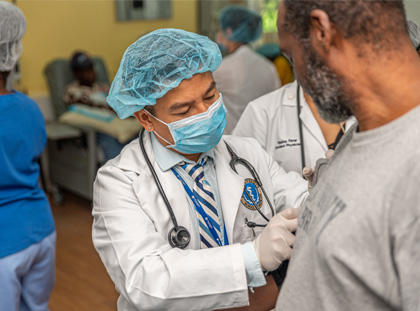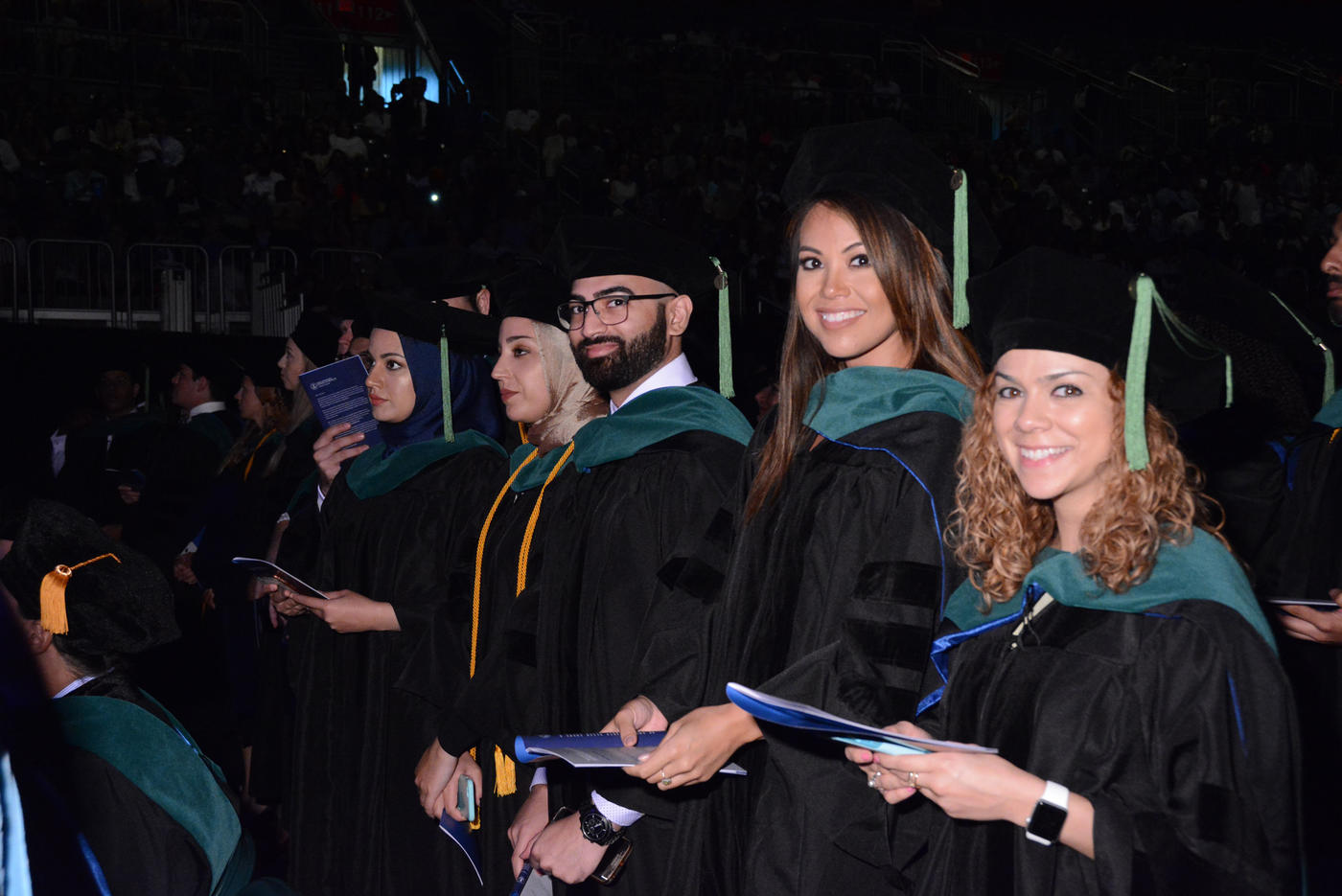Most medical schools in the U.S. accept primary applications through the American Medical College Application Service® (AMCAS®). The AMCAS opens the first week of May, but applications cannot be submitted until early June. This gives applicants time to work on and revise their application prior to submission.
There are some schools that accept applications on a rolling admission. At Ross University School of Medicine (Ross Med), applications are accepted year-round. With three flexible start dates in January, May, and September, you can submit your application on your timeline and choose a potential start to your MD journey when it works best for you. Our application process is straightforward. You can complete the Ross Med application online, or you can upload your AMCAS, AACOMAS, or TMDSAS application.
Next Steps - Secondary Applications
Once a school has reviewed the primary application, they may send secondary application prompts. This provides applicants with an opportunity to explain why they chose a specific school. You can explain how the school’s missions align with your overall plans and experiences. In the secondary application, you can also address how you will grow at this institution.
While each secondary application deadline may vary by school, we recommend submitting it within two weeks of receiving it. Medical schools will not reach out to schedule an interview before receiving the secondary application. Interview invitations are limited, and medical schools contact prospective students in the order completed applications were received.
Delays in submitting the secondary application could jeopardize your chances of being admitted for the following year. Interviews typically start around August or September and continue to the following spring. Applicants who receive an admissions offer will start their program in the fall.
Preparing Your Medical School Application
Premed students should begin preparing for their medical school application from their first day of undergraduate studies. This includes maintaining high grades, choosing the right classes and extracurriculars, gaining clinical exposure, and building solid relationships with professors. They must also prepare for the Medical College Admission Test® (MCAT®) as they complete their undergraduate studies.
Medical schools look for well-rounded applicants with excellent science grades, MCAT scores, and experience in their chosen field. As such, clinical experience and academic performance are key factors being evaluated during the admissions process. You should begin engaging in volunteer opportunities as soon and as frequently as possible.
The medical school admission process is highly competitive. As a result, premed students should begin building a strong foundation from their first day of class.
Medical School Application Timeline
Planning ahead gives you ample time to obtain application materials and relevant experience prior to submissions opening. Throughout each step of this timeline, you should remember to take care of yourself. Learning how to manage stress and when to take time for your wellbeing can prevent burnout. Tracking events in a planner or calendar application can help you track deadlines and prepare accordingly.
18-24 Months Before Applying
During freshman year, you should begin researching medical schools to identify programs aligned with your career aspirations and goals. When creating a list of potential programs, be sure to consider the curriculum and opportunities for clinical experience.
You will also need to become familiar with the admission requirements for each school on your list. This will guide your work through undergrad. This also provides ample time to course correct, if necessary, before you are too far along in your undergrad program.
It’s recommended that applicants create a study plan to effectively prepare for the MCAT. This plan may involve enrolling in a prep course, forming a study group with other premed students, or self-studying. Regardless of the method, monitor your progress by incorporating practice tests into your study plan.
If you haven’t already, you should also start building relationships with professors and mentors. As you participate in more healthcare-related volunteer activities, nurture the relationships formed with the healthcare staff. These are the professionals who may later write you a strong recommendation letter.
One Year Before Applying
Roughly a year before applying to medical school, plan to take the MCAT. This will allow you to retake the exam, if necessary, without compromising your medical school application timeline. MCAT® scores are automatically released to AMCAS and will be included in all future applications.
We recommend applicants take the MCAT the summer following their sophomore year in case they need to retake the exam.
This is also a good time to familiarize yourself with AMCAS or relevant application systems. This can help you avoid application pitfalls later down the road. It will also give the opportunity to budget for any fees associated with your application.
8-10 Months Before Applying
Now is the time to narrow down your school choices. This can help you save time and money by selecting schools aligned with your goals, experience, and qualifications. Additionally, now is the time to research grants and scholarships to help cover medical school tuition.
You can never start thinking about your personal statement too early. We recommend you give yourself plenty of time and space to draft your thoughts. Take the time to reflect on past experiences, future goals, and current motivations. Personal statements introduce you to the medical school’s admissions team and tell your personal story and journey to become a doctor. Share your draft statement with a trusted mentor or advisor. They can provide constructive feedback and advice.
3-4 Months Before Applying
During junior year, start contacting professors, healthcare professionals from previous volunteer opportunities, or mentors for recommendation letters. These letters should speak to your abilities and character. Some medical schools require recommendation letters to be sent directly from the writer to the admissions team. Be sure to review each school’s recommendation letter requirements prior to requesting and submitting them.
As recommendation letters are being written, applicants should research requirements for their school’s secondary application. They can begin drafting any essays required and gathering necessary documents.
1 Month Before Applying
The AMCAS application is open, and you can start uploading your information as well as edit existing materials such as personal essays.
Submissions Open
Once you feel ready, submit your primary application through the appropriate platform. Be patient. It takes roughly a month for processed AMCAS applications to be released to an applicant’s preferred medical school. Once reviewed, medical schools will release a secondary application for applicants to complete.
Medical School Application FAQ
Medical school applications require meticulous attention to detail. With so many parts, it can be difficult to keep track. Let’s address some frequently asked questions about medical school applications to clarify any lingering questions.
Q1: How do I start applying for medical school?
Most medical schools accepted applications through AMCAS. Applicants must complete and submit their information through AMCAS to verify and deliver their information to their chosen schools. Be sure to review each institution’s preferred method for application submission, as they can vary by school.
Q2: What year do you start applying for medical school?
Applicants should apply through AMCAS one year before they plan to enroll. Premed students interested in starting medical school immediately after undergraduate studies should apply at the end of junior year.
Q3: What is a good GPA to apply to med school?
The answer varies depending on the school and the kind of GPA they consider. At Ross University School of Medicine (Ross Med), we examine a student’s cumulative GPA and pre-medical coursework GPA. These numbers may vary.
Next Steps
The medical school application is long but can be managed with proper planning and clear timelines. It’s important you become familiar with school application requirements and begin preparing as soon as possible. Early preparation and staying on top of deadlines can help facilitate a seamless transition from undergraduate to medical student.
Ready to take the next step? Contact our admissions team or start your application today!




